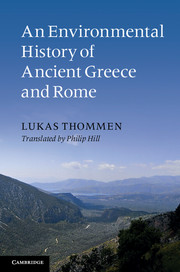Book contents
- Frontmatter
- Contents
- Figures
- Preface
- Introduction
- Part I Greece
- Part II Rome
- Chapter 11 The geographic space
- Chapter 12 People and nature
- Chapter 13 Agriculture
- Chapter 14 Forests and timber
- Chapter 15 Gardens
- Chapter 16 Animals
- Chapter 17 Food
- Chapter 18 Fire and water
- Chapter 19 Earthquakes and volcanoes
- Chapter 20 Mining
- Chapter 21 Urban problems and rural villa construction
- Chapter 22 The environment in Roman Britain
- Conclusion
- Chronology
- Further reading
- Sources
- Bibliography
- Index
Chapter 13 - Agriculture
Published online by Cambridge University Press: 05 June 2012
- Frontmatter
- Contents
- Figures
- Preface
- Introduction
- Part I Greece
- Part II Rome
- Chapter 11 The geographic space
- Chapter 12 People and nature
- Chapter 13 Agriculture
- Chapter 14 Forests and timber
- Chapter 15 Gardens
- Chapter 16 Animals
- Chapter 17 Food
- Chapter 18 Fire and water
- Chapter 19 Earthquakes and volcanoes
- Chapter 20 Mining
- Chapter 21 Urban problems and rural villa construction
- Chapter 22 The environment in Roman Britain
- Conclusion
- Chronology
- Further reading
- Sources
- Bibliography
- Index
Summary
The Romans saw themselves as a peasant people, and were proud of their rural origins. Agricultural literature, which flourished from the second century bc to the first century ad, and which propagated ties to the soil, was at the same time aimed at increasing production and profit. Agriculture was not only the basis of livelihood, but also of wealth, which was primarily manifested in landholding (Plin. epist. 3.19, 6.19).
Economic interests were also a factor in the expansion of the Roman Empire, which began to take over the entire Mediterranean region after the middle of the third century bc. Rome profited from the taxes of the provinces, and took over their landscapes, first by land surveying and parcelling, then also by intensified construction. North Africa supplied olives and cereals; Spain, wine and oil; Sicily and Egypt, cereals – the latter probably yielding two harvests a year. Under Augustus, 20 million modii – approximately 150,000 tons – of cereals were delivered to Rome each year (Aur. Vict. epit. Caes. 1.6). Despite these imports, however, scarcities were never impossible in the capital, so that Italic agriculture continued to be of great importance, despite a number of setbacks.
- Type
- Chapter
- Information
- An Environmental History of Ancient Greece and Rome , pp. 79 - 84Publisher: Cambridge University PressPrint publication year: 2012
- 1
- Cited by



